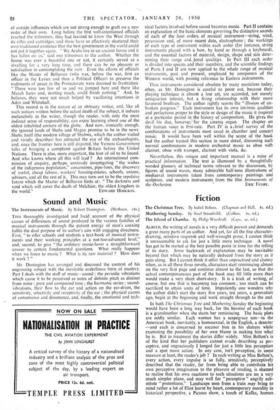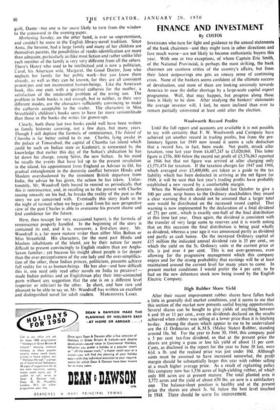Fiction
AGREED, the writing of novels is a very difficult pursuit and demands a great many parts of an author. And yet, for all the fine character- drawing, sensitive responst- and well-wrought prose, 1 cannot think it unreasonable to ask for just a little more technique. A novel has got to be started at the best possible point in time for the telling of its story. Some backwash of explanation may be inevitable beyond that which may be naturally deduced from the story as it goes along. But I cannot think it other than unpractised and clumsy when, as in all these three novels, characters start reminiscing almost on the very first page and continue almost to the last, so that the actual contemporaneous part of the book may fill little more than would make a very short short-story. It is a trick of writing, of course, but one that is becoming too common ; too much can be sacrificed to attain unity of time. Impatiently one wonders why the author didn't start the story five years, ten years, a generation ago, begin at the beginning and work straight through to the end.
In both The Christmas Tree and Mothering Sunday the beginning would have been a long way back, for the heroine of each book is a grandmother when she starts her reminiscing. The basic plots are oddly similar. Each woman has a scapegrace son—in the American book, inevitably, a homosexual, in the English, a deserter —and each is concerned to succour him in his distress while examining the possibility of her own blame in making him what he is. But in treatment the stories differ widely. Miss Bolton's is of the kind that her publishers cannot evade describing as per- ceptive, and ungraciously I longed for just a little less perception and a spot more action. In any case, isn't perception, in some measure at least, the reader's job ? In such writing as Miss Bolton's, every action, every impulse is so fully, sensitively, perceptively described that the reader, far from being able to contribute his own perceptive imagination to the pleasure of reading, is shamed to realise that his own reactions to such situations are on a very much simpler plane, and may well for " perceptive " angrily sub- stitute " pretentious." Landscape seen from a train may bring to mind rather a lot of Eliot learnt by heart, contemporary morality in historical perspective, a Picasso show, a touch of Kafka, human . guilt, Dante—but one is tar more likely to turn from the window to the crossword in the evening-paper.
Mothering Sunday. on the other hand, is ever so unpretentious, and couldn't be more in the English library-novel tradition. Since
Anna, the heroine, had a large family and many of her children are themselves parents, the possibilities of reader-identification are more than adequate, particularly as (like most fiction and rather unlike life) each member of the family is very very different from all the others. There's Henry who used to be intellectual and is now a politician, Carol, his American wife, Margaret. the Good Doctor, Jane who neglects her family for her public work—but you know them already, as well as they can be known, for they are all consistent prototypes and not inconsistent human-beings. Like the American book, this one ends with a spiritual catharsis for the mother, a satisfaction of the intolerable problem of the erring son. The problem in both books is real enough, but in neither, in their very different modes, are the characters sufficiently convincing to make the catharsis acceptable to the reader. The characters in Miss Streatfeild's children's books seem to have far more verisimilitude than those in the books she writes for grown-ups.
Clearly, both these last two books could well have been written as family histories covering, not a few days, but many years. Though I still deplore the formula of reminiscence, The Island of Chamba is far better suited to its use. Charles, lying awake in the palace at Timurabad, the capital of Chamba (an island which could be such an Indian state as Kashmir), is tormented by the knowledge that earlier this day of the Sultan's abdication he has let down his charge, young Selim, the new Sultan. In his mind he recalls the events that have led up to the present revolution in the island, his appointment from England as Adviser in Oil, his gradual entanglement in the domestic conflict between Hindu and Moslem overshadowed by the imminent British departure from India, the advice he has given, the action he has taken. Unfor- tunately, Mr. Woodruff feels bound to remind us periodically that this is reminiscence, and, in recalling us to the present with Charles tossing uneasily on his bed, he breaks the reality of the past as the story we are concerned with. Eventually this story leads us to the night of turmoil when we began ; and from his now perspective view of the past Charles is able to overcome his present shame and find confidence for the future.
Here, then (except for very occasional lapses), is the formula of reminiscence properly handled. In the beginning of the story is contained its end, and it is, moreover, a first-class story. Mr. Woodruff is a far more mature writer than either Miss Bolton or Miss Streatfeild. His characters, for the most part Hindu and Moslem inhabitants of the island, are by their nature far more difficult to present convincingly to English readers than are Anglo- Saxon families ; yet because his insight about people is far deeper than the over-perceptiveness of the one lady and the over-simplifica- tion of the other, these Indian princes, politicians, peasants achieve full reality for us as human-beings. He has also—and how difficult this is, one need only read other novels on India to perceive!— made Indian politics and an Englishman play their inter-connected parts without any suggestion. that the one is on a different level (superior or inferior) to the other. In short, and how rare and pleasant to be able to say so, Mr. Woodruff has written an excellent and distinguished novel for adult readers. MARGHANITA LASKI.



































 Previous page
Previous page